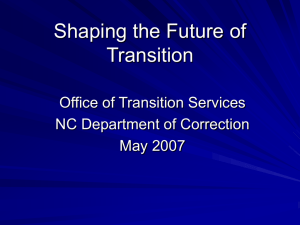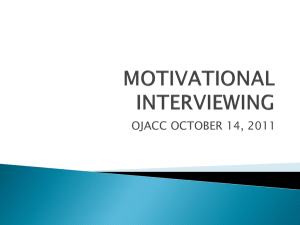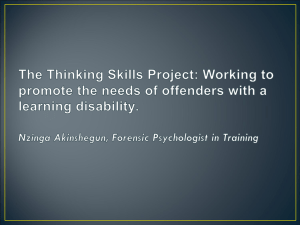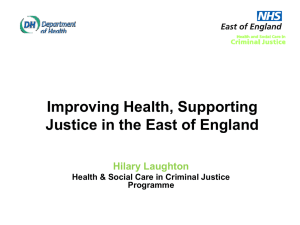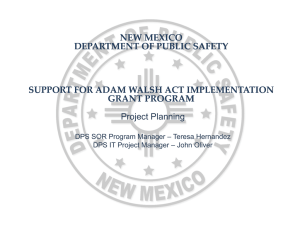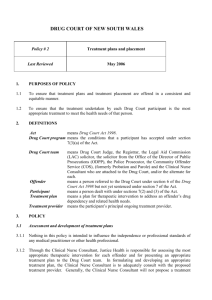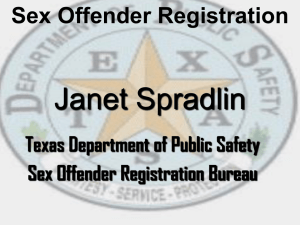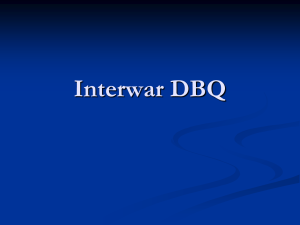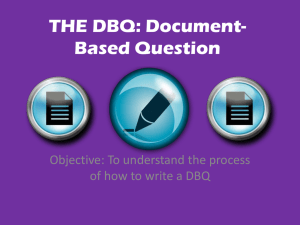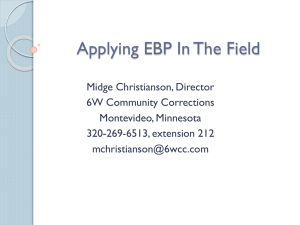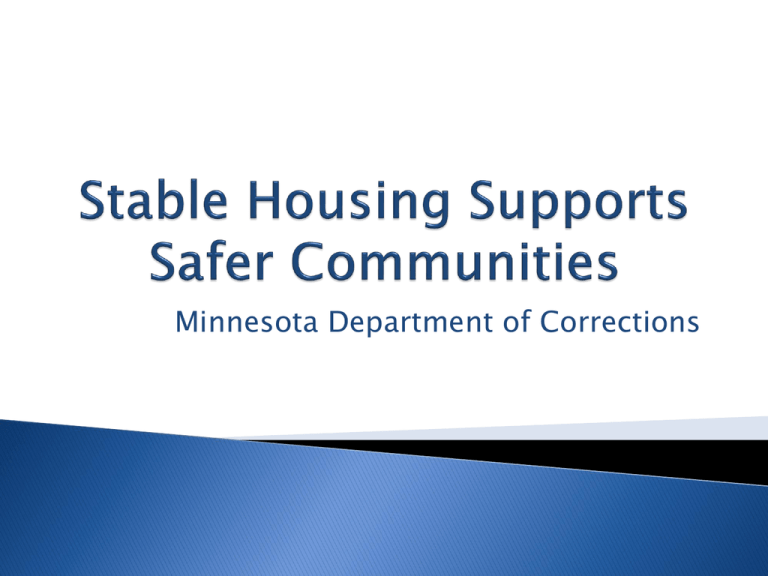
Minnesota Department of Corrections
Mission Statement:
To hold offenders accountable and offer
opportunities for change while restoring justice
for victims and contributing to a safer
Minnesota.
Approximately 116,000 people on probation
in MN (“2012 Probation Survey” www.doc.state.mn.us)
◦ 60,000 = 7 county metro area
◦ 56,000 = Non-metro counties
◦ Approximately 900 in Clay Co. (78% male; 22%
female)
Supervised Release = Supervised Release,
Parole, Intensive Supervised Release,
Challenge Incarceration Program
6,015 Individuals released in 2012
83 Individuals released to Clay Co.
Our Vision
Foster community partnerships
Optimizing best practices
Creating a respectful diverse culture
Utilizing effective communication
Strategic and efficient use of resources
FOCUS on reducing risk
1800s-1980s – Halfway Houses.
1990s – Increase in facility based programs
that targeted chemical dependency and
issues associated with sexually based
offenses – releases to CD and SO treatment
programs increased.
2000s – Offender Reentry – targeted focus for
policy makers
Q) What did this mean for the DOC?
◦ A) Additional budgetary support within the DOC for
housing based services.
DOC Leased ISR residences
Emergency Housing Funds/Female Offender Housing
Funds
2010 – DOC Field Services Housing
Coordinator
◦ Work to increase housing resources available to
clients on correctional supervision.
◦ Assist agents in accessing and/or referring clients
to housing/homeless related resources. (DOC
and/or non-DOC resources).
◦ Assist with monitoring and managing DOC Leased
ISR residences.
2012 – Rental Assistance for Homeless
Offender Program
◦ 3-6 mo. of rental assistance for clients on DOC
adult felony level supervision who are homeless or
at risk of homelessness.
◦ Available to individuals on probation and
supervised release caseloads.
“…designed to help persons who are formerly
incarcerated to re-integrate into communities
through rental assistance funding.”
Two year grant
“…Fund temporary rental assistance, security
deposits and housing related expenses for
individuals being released from a MN
correctional facility.”
Eligible applications – current RA
administrators under MN Housing Trust Fund
“Grants are anticipated to be awarded
throughout the state.”
Deadline for applications – 4:30pm on
November 25
Automated & Validated Risk Tools
Cognitive/Behavioral Programming
Case Plans
Restorative Justice
Primary Services
Supervision Workload Standards
Transition/Aftercare Services
Outcomes Measures
Standard Conditions of Release
◦ The offender must go directly and report to the
agent/designee by telephone or by personal visit
within 24 hours of release …if offender fails to
report, a fugitive warrant will be issued…”
◦ The offender must reside at the approved residence
and may not change residence until approved by
the agent/designee. The offender will keep the
agent/designee informed of his/her daily activities.
Daily activities must be constructive and include
those designed to obtain/maintain employment
and/or attend treatment or education program as
directed.
The offender will submit reports as required
by the agent/designee and will respond
promptly to any communication regarding
release. The offender will maintain contact
with the agent/designee.
The offender will at all times follow the
instructions of the agent/designee. The
offender must sign release(s) of confidential
information for medical/mental health
treatment, or any other required
programming as directed.
“The offender will refrain from the use or
possession of intoxicants and will not
possess …mood altering substances …”
“…must not purchase or otherwise obtain
…any dangerous firearm or weapon.”
“Conviction of any petty misdemeanor, gross
misdemeanor, or felony…involvement in any
activity defined as criminal…signed criminal
complaint …will all be considered grounds to
hold the offender in custody…”
“…Must inform agent…court appearance
within 24 hours.
“…not leave the state of MN without
permission…”
“…not engage in any abusive, assaultive,
violent behavior…”
“…not have direct or indirect contact of
victims of current or previous offenses…”
“…pay restitution…”
“…Submit to unannounced visits…”
Must complete a chemical use assessment
and follow recommendations.
Must complete sex offender programming
and follow recommendations
Must not have contact with any organized
groups or clubs identified as security threat
groups or gangs.
Must not borrow money …
No contact with minors …
Must not operate a motor vehicle …
Agents can serve as an unofficial “property
manager”
Landlords can connect with agents to assist
with mediating issues
Lease addendums that include conditions of
supervision
Utilize DOC targeted resources to help obtain
and start client in their rental residence
Public Housing and Prisoner Re-entry
◦ Larger metropolitan areas
◦ Burlington (Vermont) Housing Authority – set-aside
Section 8 housing vouchers.
◦ of Shelter Plus Care resources to eligible individuals
who are incarcerated (Portland, Oregon).
◦ Case management partnership between the housing
authority and service provides targeted towards
individuals exiting incarceration to homelessness
(Salt Lake County, Utah).
Boston Reentry Initiative
◦ Inter-agency program that targets male offenders
who are reentering local Boston communities and
are at a high risk of recidivism..
◦ Collaboration between several local, state, and
federal agencies and non-profits.
◦ Provides individuals with access to transition and
reintegration services – job training, housing
assistance, and health services.
◦ Funded through Second Chance Act and the Serious
and Violent Offender Reentry Initiative.
Christian Restoration Services, Inc.,
Minneapolis MN
◦ Permanent Supportive Housing for Ex-offenders
◦ Targeted towards homeless ex-offenders with
disabilities.
◦ Faith based
◦ Partnerships between churches, faith-based
organizations, community agencies, and criminal
justice system.
◦ Emphasis on accessing community resources,
employment, mentoring
FUSE (Frequent Users System Engagement)
◦ Corporation for Supportive Housing (CSH) Returning
Home Initiative
◦ Break the cycle of incarceration and homelessness
among individuals with complex behavioral health
challenges who are the highest users of jail,
homeless shelters and other crisis service use
◦ Three pillars
Data-Driven Problem-Solving
Policy and Systems Reform
Targeted Housing and Services
www.weareallcriminals.com
◦ Emily Baxter, works with the Council on Crime and
Justice
◦ 1 in 4 Minnesotans has a criminal record – what
would your life be like if you were convicted of an
offense
Federal Interagency Reentry Council
◦ Reentry Myth buster
Adult Pre-Release Handbook
www.doc.state.mn.us
◦ More details of reentry programming and activities,
and contact information for staff who work directly
with the MN DOC Reentry Unit.
Kate Erickson
MN DOC Field Services Housing Coordinator
(320)345-0051 – cell
Kate.a.erickson@state.mn.us

